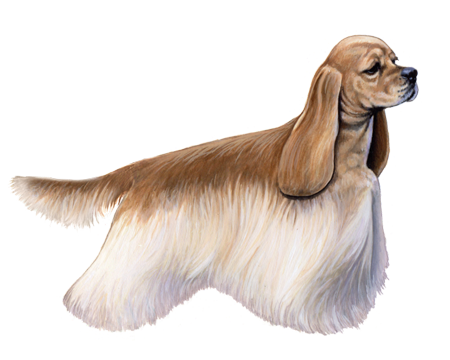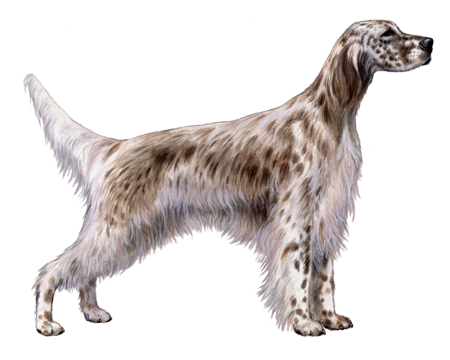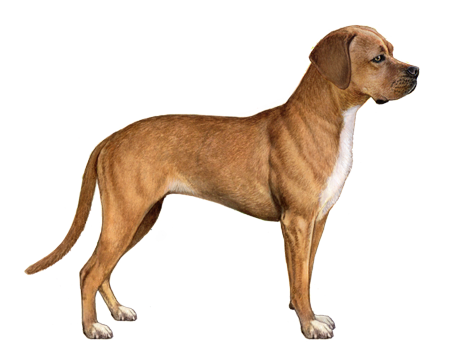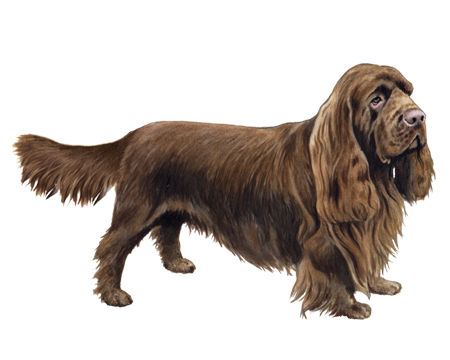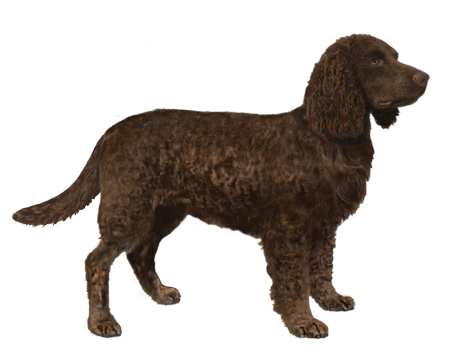
Boykin Spaniel
The Boykin Spaniel is a medium-sized, sturdy sporting breed. With proven retrieving and flushing instincts and adept hunting ability, Boykin Spaniels are first and foremost working dogs. But their friendly dispositions also make them exceptional pets and companions.
Interested in discovering if your dog is a Boykin Spaniel?
Check out Wisdom Panel's DNA tests.

Boykin Spaniel Traits
General Appearance
Boykin Spaniels are medium-size, well-built sporting dogs. Like other members of the spaniel family, they have sturdy bodies, intelligent expressions, and wagging tails.
Coat and Colouring
Their coats can be many shades of liver: rich liver, brown, or dark chocolate. A small white chest blaze is possible in this breed.
Distinctive Physical Traits
Their oval-shaped, trusting eyes can range in color from yellow to amber to varying shades of brown. Boykin Spaniels carry their tails horizontally or slightly elevated, and they happily and readily wag them—especially when the dogs find game.
Boykin Spaniel Temperament
Boykin Spaniels are loyal, active, family dogs. They’re an even-tempered, friendly, sociable breed that’s good with both children and other dogs. And their size makes it easy to include them on family outings.
Boundless enthusiasm and endurance characterize the breed. So, not surprisingly, Boykin Spaniels require daily physical and mental exercise. If they have pent up energy or get bored, they may become destructive.
Boykin Spaniels are inquisitive dogs and have an excellent sense of smell. These qualities help them excel at hunting but may lead them to roam free in search of wildlife (or adventure) if left to their own devices. So, it’s best to keep them in a fully-fenced yard or on a leash.


Boykin Spaniel History
The Boykin Spaniel originated in South Carolina in the early 1900s.
The breed’s name comes from Lemuel Whitaker Boykin, who developed a multi-purpose dog that excelled in retrieving from both land and water. This medium-sized spaniel—bigger than a Cocker Spaniel but smaller than a Springer Spaniel—was compact enough to jump in and out of a boat without rocking it too much. Thus, the Boykin Spaniel became known as the breed that wouldn’t “rock the boat.”
Boykin crossbred several breeds of hunting dogs—including Chesapeake Bay Retrievers, Springer Spaniels, Cocker Spaniels, and American Water Spaniels—to develop the Boykin Spaniel as it’s known today. But according to local lore, it all started with a mixed-breed spaniel named Dumpy.
As the story goes, a man named Alexander White found Dumpy outside a church in Spartanburg. White gave the dog to Boykin when he showed some aptitude for retrieving. Boykin became fascinated by Dumpy’s skills and built a breeding program around him.
The Boykin Spaniel received full recognition by the AKC in 2009, and it is now the state dog of South Carolina.
Boykin Spaniel Care
Nutrition
Boykin Spaniels need high-quality food that’s appropriate for their life stage (e.g., puppy, adult, senior). A diet formulated for medium-size dogs is a good option to consider.
All dogs have the potential to become overweight or obese. To prevent harmful weight gain, you should closely monitor food portions. Avoid accidental overfeeding by using a standard measuring cup to measure out their meals. And be sure to take treats into account when tracking their daily calorie intake. As a guideline, treats should make up no more than 10% of their calories for the day.
Grooming
The breed’s long ears can make Boykin Spaniels more susceptible to ear infections. So, you should check and clean their ears routinely to prevent infections from developing. Likewise, trim their nails regularly to avoid pain or issues with walking or running.
Maintaining good dental hygiene is important for the overall long-term health of all dogs. In addition to professional dental cleanings, an at-home routine—including regular teeth brushing—should be established.
Exercise
Boykin Spaniels are high-energy dogs that need daily physical and mental exercise. They’ll happily join their humans for long walks or runs, and enjoy games and play sessions in the backyard.
Participating in obedience, tracking, agility, rally, and field events will not only provide much-needed exercise but also let them show off their athleticism.
Bred to work in the lakes and swamps of South Carolina, Boykin Spaniels are strong swimmers and take to water easily. So, for Boykin Spaniels, swimming is another excellent way for them to stay physically active.
Training
Boykin Spaniels are eager to please and easily trained using motivational tools such as a favorite treat or toy. Showing them love and personal attention improves their desire to hunt. As with all breeds, early socialization will help them develop into well-mannered adult dogs.
Boykin Spaniel Genetic Health Conditions
-
Chondrodystrophy (CDDY) and Intervertebral Disc Disease (IVDD) Risk
Chondrodystrophy (CDDY) is a skeletal disorder characterized by shortened limbs and abnormal early degeneration of the spinal discs, or intervertebral disc disease (IVDD), which predisposes to disc herniation.
Knowing if your Boykin Spaniel is a carrier or at-risk for these conditions can help you and your veterinarian plan for your pup's lifelong care. With Wisdom Panel™ Premium, you can get results for over 200 genetic health tests.
Breed Group
Sporting
The sporting group breeds are incredibly diverse in personality and appearance, but can be characterized as very sturdy. They were developed to work closely with people and in general have a very responsive nature and high intelligence.
Resources
https://www.akc.org/dog-breeds/boykin-spaniel/
http://images.akc.org/pdf/breeds/standards/BoykinSpaniel.pdf
Reviewed 26 July 2020 by Laura Inman, DVM













